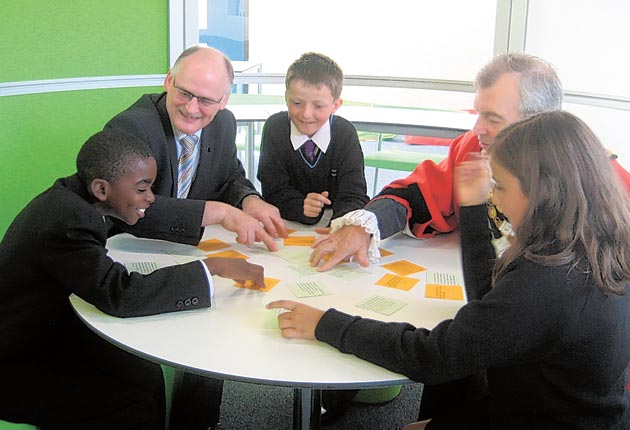For these new pupils, the first question is: Who am I?
Swedish-style academies welcome their first students

Michael Gove, the Secretary of State for Education, has often talked about importing a Swedish-style teaching revolution to England's state-school system.
Yesterday it arrived for real as the first academy to be run by the Kunskapsskolan group opened its doors to pupils. The first-year youngsters who arrived at the Twickenham Academy will be facing a very different style of education from their predecessors at Whitton School, the comprehensive it has replaced. For a start, they will be wearing school uniforms designed by the students. (There has been a good, old-fashioned British compromise here. In Sweden, Kunskapsskolan pupils do not wear uniform, but here the school has bowed to parents' pressure by designing a uniform with the school logo. There are, however, several designs from which pupils can choose.)
That change may be symbolic, but the real difference will be in the way that the curriculum has been devised. In core subjects, such as maths, English, science and IT, 40 steps to learning have been identified. Each pupil will start at the step which is appropriate to their ability in the subject – rather than all 11-year-olds being taught the same curriculum. The logical conclusion of this is that the brightest pupils will take their exams early.
"This is the personalised curriculum for every student," said Steve Bolingbroke, head of Kunskapsskolan in the UK. "The most crucial difference about our model is getting students to take responsibility for their own learning.
"All students are capable of amazing things. It's just that sometimes we need to trust them to do them. There has been too much emphasis on just filling people's brains. We like to light a spark rather than fill a vessel."
Beyond the core subjects, pupils will be taught through themes. For the first half of the term, that theme will be "Who am I?". The idea is to find out which areas of learning pupils are good at, what they enjoy and what they don't like. This will then help them and their tutors to plot a curriculum which is suitable for them. The second half of the term will be devoted to "Who rules?", a topic enabling youngsters to dip into history, geography and politics.
"It will look at history from the point of view of the medieval world," said Mr Bolingbroke. "It will look at who's in charge, what they do and the geography of the country they're ruling."
The Twickenham Academy is one of two Kunskapsskolan academies opening in the borough of Richmond upon Thames in south-west London. The second will open on Monday to replace Hampton Community College. Sue Demont, who was headteacher of the community college for five years before the switch, said that a shortage of funds had hampered planning for the future. Now, she says extra money will allow smaller classes and more tutorials.
Perhaps ironically, although Mr Gove has been most vocal in espousing the Swedish model of education, both these academies were conceived under the Labour academies programme promoted by Lord Adonis when he was minister for schools.
To some, particularly on the right wing of the Conservative Party, it may seem odd that Mr Gove's first brush with structural reform in schools should usher in such a liberal style of education. He, however, is adamant: it is all about choice.
A third Kunskapsskolan academy is planned for Ipswich in the new year. It too will replace an existing school. Kunskapsskolan UK is also in negotiation with three further local authorities and eventually plans to run five academies. It is also turning its attention to the second strand of Mr Gove's reforms: setting up independent "free" schools which will be government-funded but run by teachers, parents or charities.
Kunskapsskolan is in negotiation with the Department for Education to establish between 20 and 30 of these schools. Mr Bolingbroke would like the new Coalition Government to relax the rules governing "free" schools and to allow groups like Kunskapsskolan to set them up from scratch rather than just working with local parents' groups to supply them.
"We're not really in the same business as the other private-education companies in providing an administration," he explained. "We're providing a different kind of education."
Kunskapsskolan is anxious to stress it is not simply implanting the Swedish education system lock, stock and barrel into the UK. It argues it is merely importing a different education concept to these shores. In case anyone suggests it is taking over the English education system, it is operating a very strict rule of thumb. it has vowed that it will never educate more than a quarter of the pupils in any one education area.
The Timetable
*First half of autumn term: a project entitled "Who am I?". It is geared towards helping pupils find out about themselves, what their strengths are, and what lessons they like and do not like. This will give them – in conjunction with their tutors – an idea of what timetable would suit them from the second half of the term onwards: are they good at creative arts or do they want to focus on science?
*Second half of autumn term: the theme will be "Who rules?" and will look at history from the perspective of the medieval world, and look at who is in power and how they got there. It will take in the geography of the place that they rule and could, of course, have important implications for the use of power in the modern day. Politics could also be introduced as a topic, showing what motivates the rulers into reaching the decisions they come to.
Join our commenting forum
Join thought-provoking conversations, follow other Independent readers and see their replies
Comments
Bookmark popover
Removed from bookmarks